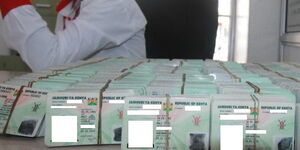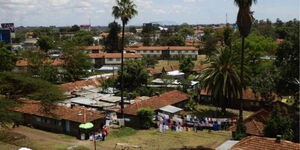On November 4, group of men stormed Akidiva Memorial Hospital in Migori County and attempted to forcefully free their wives who had been detained at the facility.
The 15 mothers were detained at the hospital for weeks after failing to pay maternity bills. The hospital demanded Ksh30,000 for cesarean delivery and Ksh10,000 for normal delivery.
Their bills were to be catered for by their insurance cover - Linda Mama which is under the National Hospital Insurance Fund (NHIF).
However, they had no idea that Linda Mama service had been halted and were shocked when the hospital demanded cash payment instead.
Some of the irate husbands told the media that the hospital informed them that NHIF and Linda Mama cards would cater for all their wives’ bills when they were admitting them at the facility.
Their plight once again exposed Kenya's sick health sector that has turned millions into abject poverty.
The 2019 Catastrophic Health Expenditures and Impoverishment in Kenya Survey showed that medical bills are turning 4.5 million Kenyans from breadwinners into paupers annually.
"10.7% of the population incur catastrophic health payments," the report reads in part.
Five years ago, the nation was in an uproar after Alex Madaga, an accident victim died after being kept in an ambulance for 18 hours due to his inability to raise Ksh200,000 cash deposit.
Intensive Care Unit (ICU) deposits are usually the highest averaging at Ksh500k across most major hospitals in the country, with some hospitals known for failing to admit a patient in serious conditions if a significant downpayment is not made.
Here's the catch despite part of the deposit being refundable depending on how quickly the patients recover, they usually end up consuming the entire amount requiring even more money.
There are hundreds of thousands of cases of families pleading with hospitals and public at large to help the foot a bill that would enable them have their loved ones released from hospital.
Sadly, majority of these cases involve families seeking to have the bodies of their loved ones released to them for burial.
In March 2017, the nation was in shock after the story of a baby named Angie emerged.
She was in critical condition, experiencing seizures, and in dire need of ICU services. Her parents had to deposit some Ksh300,000 for Angie to get a bed at the ICU.
Despite a month of treating Angie, she did not make it and passed on. In addition to the Ksh300,000 that her parents had managed to raise and pay to the hospital, they were handed a Ksh3 million bill for the tests and treatment that Angie went through while admitted at the hospital.
Bed charges at the ICU facilities per day range between Ksh35,000 and Ksh45,000.
When it comes to pregnancies, hospitals have been accused of pushing for cesarean section even when it's unnecessary, as it guarantees more money
In 2018, the Jubilee Government embarked on the Big 4 Action Plan, committing to expand Universal Health Care (UHC) to the entire Kenyan population by 2022.
However, many Kenyans are forced to create WhatsApp groups and reach out to friends and family for the purpose of raising money to cover medical expenses incurred, as families end up drained beyond their financial capacity.












